 Tìm kiếm
Tìm kiếm
Chương 4 Luật Sĩ quan Quân đội nhân dân Việt Nam 1999: Sĩ quan dự bị
| Số hiệu: | 16/1999/QH10 | Loại văn bản: | Luật |
| Nơi ban hành: | Quốc hội | Người ký: | Nông Đức Mạnh |
| Ngày ban hành: | 21/12/1999 | Ngày hiệu lực: | 01/04/2000 |
| Ngày công báo: | 15/02/2000 | Số công báo: | Số 6 |
| Lĩnh vực: | Bộ máy hành chính | Tình trạng: | Còn hiệu lực |
TÓM TẮT VĂN BẢN
Văn bản tiếng việt
Văn bản tiếng anh
Sĩ quan dự bị gồm có sĩ quan dự bị hạng một và sĩ quan dự bị hạng hai theo hạn tuổi quy định tại khoản 1 Điều 13 của Luật này.
Những người sau đây phải đăng ký sĩ quan dự bị:
1. Sĩ quan, cán bộ là quân nhân chuyên nghiệp khi thôi phục vụ tại ngũ còn đủ tiêu chuẩn và điều kiện của sĩ quan dự bị;
2. Quân nhân chuyên nghiệp, hạ sĩ quan khi thôi phục vụ tại ngũ và hạ sĩ quan dự bị đã được đào tạo sĩ quan dự bị;
3. Cán bộ, công chức ngoài quân đội và những người tốt nghiệp đại học trở lên có chuyên môn phù hợp với yêu cầu của quân đội, đã được đào tạo sĩ quan dự bị.
Căn cứ vào kế hoạch của Chính phủ, Bộ trưởng Bộ Quốc phòng được quyền:
1. Gọi đào tạo sĩ quan dự bị đối với cán bộ, công chức, sinh viên và những người tốt nghiệp đại học trở lên ngoài quân đội;
2. Gọi sĩ quan dự bị vào phục vụ tại ngũ trong các trường hợp sau đây:
a) Trong thời bình, đối với sĩ quan dự bị chưa phục vụ tại ngũ; thời gian phục vụ tại ngũ là 2 năm;
b) Trong thời chiến, khi có lệnh tổng động viên, động viên cục bộ hoặc khi có nhu cầu sĩ quan làm nhiệm vụ chiến đấu, phục vụ chiến đấu bảo vệ chủ quyền lãnh thổ mà chưa đến mức động viên cục bộ.
Việc bổ nhiệm chức vụ, phong, thăng quân hàm đối với sĩ quan dự bị được quy định như sau:
1. Học viên tốt nghiệp đào tạo sĩ quan dự bị được phong quân hàm Thiếu uý sĩ quan dự bị;
2. Cán bộ, công chức tốt nghiệp đào tạo sĩ quan dự bị thì căn cứ vào chức vụ được bổ nhiệm trong các đơn vị dự bị động viên, kết quả học tập, rèn luyện và mức lương đang hưởng để xét phong cấp bậc quân hàm sĩ quan dự bị tương xứng;
3. Căn cứ vào nhu cầu biên chế, tiêu chuẩn chức vụ của sĩ quan, kết quả học tập quân sự và thành tích phục vụ quốc phòng, sĩ quan dự bị được bổ nhiệm chức vụ trong các đơn vị dự bị động viên và được thăng cấp bậc quân hàm tương xứng với chức vụ đảm nhiệm;
4. Thời hạn xét thăng quân hàm sĩ quan dự bị dài hơn 2 năm so với thời hạn của mỗi cấp bậc quân hàm sĩ quan tại ngũ quy định tại khoản 2 Điều 17 của Luật này;
5. Sĩ quan dự bị vào phục vụ tại ngũ thì căn cứ vào tiêu chuẩn, quy định cấp bậc quân hàm của chức vụ được bổ nhiệm, cấp bậc quân hàm sĩ quan dự bị hiện tại và thời hạn xét thăng quân hàm để xét thăng cấp bậc quân hàm tương xứng.
Sĩ quan dự bị có trách nhiệm sau đây:
1. Đăng ký, chịu sự quản lý của chính quyền và cơ quan quân sự địa phương nơi cư trú hoặc công tác và đơn vị dự bị động viên;
2. Tham gia các lớp huấn luyện, tập trung kiểm tra sẵn sàng động viên, sẵn sàng chiến đấu theo quy định của Bộ trưởng Bộ Quốc phòng;
3. Hoàn thành chức trách, nhiệm vụ được giao trong lực lượng dự bị động viên;
4. Vào phục vụ tại ngũ theo quy định tại khoản 2 Điều 40 của Luật này.
Sĩ quan dự bị có quyền lợi sau đây:
1. Được hưởng phụ cấp trách nhiệm quản lý đơn vị dự bị động viên; trong thời gian tập trung huấn luyện, kiểm tra sẵn sàng động viên, kiểm tra sẵn sàng chiến đấu được hưởng lương, phụ cấp, trợ cấp, được khám bệnh, chữa bệnh tại các cơ sở quân y và được hưởng các chế độ khác do Chính phủ quy định; được miễn thực hiện nghĩa vụ lao động công ích;
2. Sĩ quan dự bị được gọi vào phục vụ tại ngũ trong thời bình, khi hết thời hạn được trở về cơ quan hoặc địa phương trước khi nhập ngũ và tiếp tục phục vụ trong ngạch dự bị; trường hợp quân đội có nhu cầu, sĩ quan có đủ tiêu chuẩn thì được chuyển sang ngạch sĩ quan tại ngũ.
1. Sĩ quan dự bị hết hạn tuổi dự bị hạng một quy định tại khoản 1 Điều 13 của Luật này thì chuyển sang sĩ quan dự bị hạng hai.
2. Sĩ quan dự bị hết hạn tuổi dự bị hạng hai hoặc không còn đủ điều kiện, tiêu chuẩn thì giải ngạch sĩ quan dự bị.
Việc chuyển hạng và giải ngạch sĩ quan dự bị do cấp có thẩm quyền quyết định.
Article 38.- Classes of reserve officers
The reserve officers shall be classified into the class-one reserve officers and class-two reserve officers according to age limits prescribed in Clause 1, Article 13 of this Law.
Article 39.- Subjects of reserve officers registration
The following persons shall be subject to reserve officers registration:
1. Officers, cadres being professional military personnel, who, when discharged from the active service in the army, still meet the criteria and conditions prescribed for reserve officers;
2. Professional military personnel and non-commissioned officers, who have been discharged from active service in the army, and reserve non-commissioned officers who have been under the officers’ training;
3. State officials and employees outside the army and persons with university or higher degrees and with profession suited to the requirements of the army, who have been trained as reserve officers.
Article 40.- Summoning persons for reserve officers’ training and summoning reserve officers for active service in the army
Basing him/herself on the Government’s plan, the Minister of Defense shall have the right to:
1. Summon State officials and employees, students and persons with university or higher degrees outside the army for reserve officers’ training;
2. Summon reserve officers for active service in the army in the following cases:
a) During peace time, for reserve officers who have not yet served in the army, the time for active service is two years;
b) During war time, when there are orders for general mobilization, local mobilization or when there is demand for officers to assume combat tasks, combat services for the defense of territorial sovereignty, but not to the extent of local mobilization.
Article 41.- Post appointment, rank bestowment and promotion for reserve officers
The post appointment, and rank bestowment and promotion for reserve officers are stipulated as follows:
1. Cadets graduating for reserve officers’ training schools shall be bestowed the rank of second lieutenant of reserve officers;
2. State officials and employees graduating from reserve officers’ training schools shall, depending on the to be-appointed posts in the reserve units, their study and training results and their current salary levels, be considered for promotion to corresponding grades of reserve officers;
3. Depending on the staff demand, the criteria for the officers’ posts, the military study results and achievements in military service, reserve officers shall be appointed to posts in the reserve units and promoted to ranks corresponding to the posts they are holding;
4. The time limits for reserve officers’ rank promotion consideration shall be two years longer than the time limits for each grade of active officer prescribed in Clause 2, Article 17 of this Law;
5. Reserve officers shall be considered for promotion to corresponding grades, based on the criteria and regulations on the army grades of the posts they are appointed to, their current grades of reserve officers and the time limits for rank promotion consideration.
Article 42.- Responsibilities of reserve officers
The reserve officers shall have the following responsibilities to:
1. Make registration and submit to the management of the local administration and military offices of localities where they reside or work and the reserve army units;
2. Participate in training courses, gather for examination of mobilization readiness and combat readiness according to the regulations of the Minister of Defense.
3. Fulfill their assigned missions and tasks in the reserve force;
4. Serve in the army as prescribed in Clause 2, Article 40 of this Law.
Article 43.- The interests of reserve officers
The reserve officers shall have the following interests:
1. To enjoy responsibility allowances for the management of reserve army units; during the time of gathering for training, mobilization readiness examination and combat readiness examination, to enjoy wages, allowances, subsidies, medical examination and treatment at military medical establishments as well as other regimes prescribed by the Government; to be exempt from performing public labor duties;
2. Reserve officers summoned for service in the army during peace time, when the time limits expire, they are entitled to return to their offices or localities where they worked or lived before joining the army and continue to serve in the reserve force; where the army has the demand, officers who satisfy the criteria shall be transferred to the status of active officers.
Article 44.- Class transfer and relieving from reserve officers status
1. Reserve officers with ages reaching beyond the class-one reserve ages prescribed in Clause 1, Article 13 of this Law shall be transferred to class-two reserve officers.
2. Reserve officers with ages reaching beyond the class-two reserve ages or failing to meet the conditions and criteria shall be relieved from the status of reserve officers.
The class transfer and reserve officer status relief shall be decided by the competent authorities.
Cập nhật
Bài viết liên quan
Tuổi nghỉ hưu của quân nhân chuyên nghiệp mới nhất 2025 là bao nhiêu?
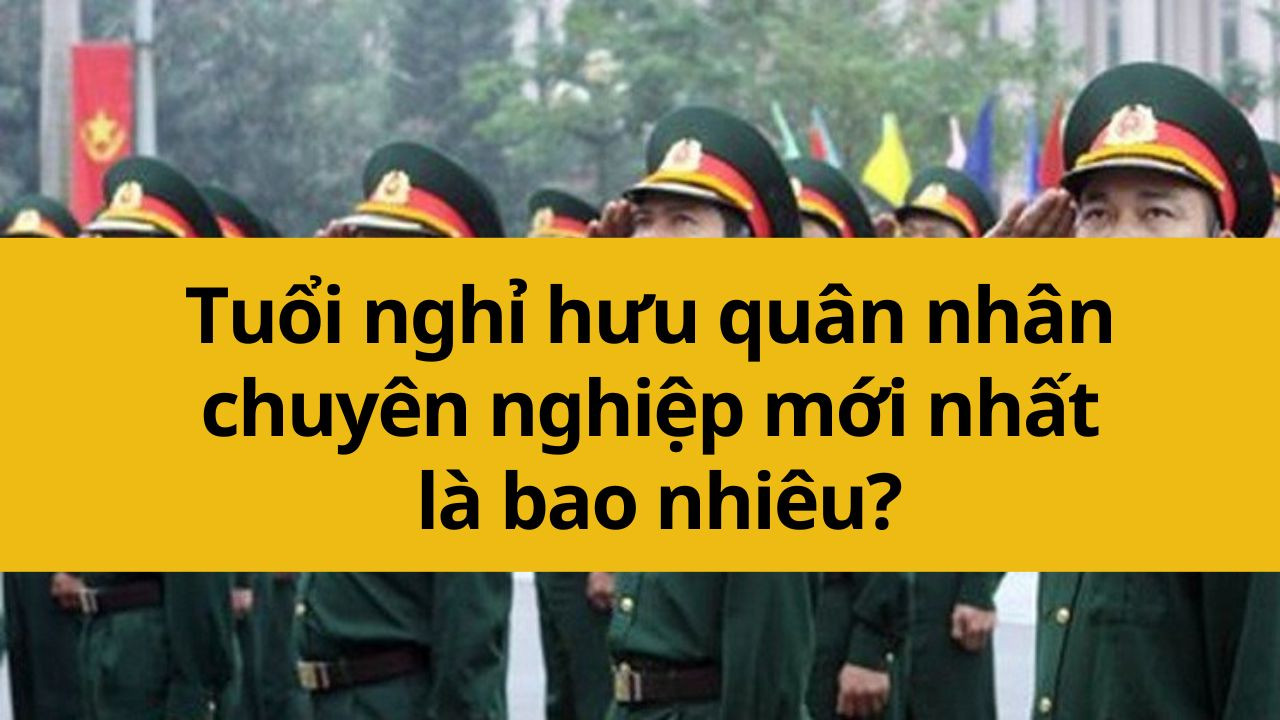
Tuổi nghỉ hưu của quân nhân chuyên nghiệp mới nhất 2025 là bao nhiêu?
Tuổi nghỉ hưu của quân nhân chuyên nghiệp là một trong những vấn đề quan trọng trong việc quản lý nhân sự trong quân đội. Mỗi năm, các quy định về độ tuổi nghỉ hưu có thể được điều chỉnh để phù hợp với yêu cầu công tác và sự phát triển của lực lượng vũ trang. Trong năm 2025, độ tuổi nghỉ hưu của quân nhân chuyên nghiệp đã được quy định cụ thể, nhằm đảm bảo sự ổn định và hiệu quả trong công tác tổ chức, điều động nhân sự. Bài viết này sẽ cập nhật thông tin về tuổi nghỉ hưu của quân nhân chuyên nghiệp theo quy định mới nhất. 31/12/2024Sĩ quan quân đội khi nghỉ hưu thì được hưởng những quyền lợi gì mới nhất 2025?
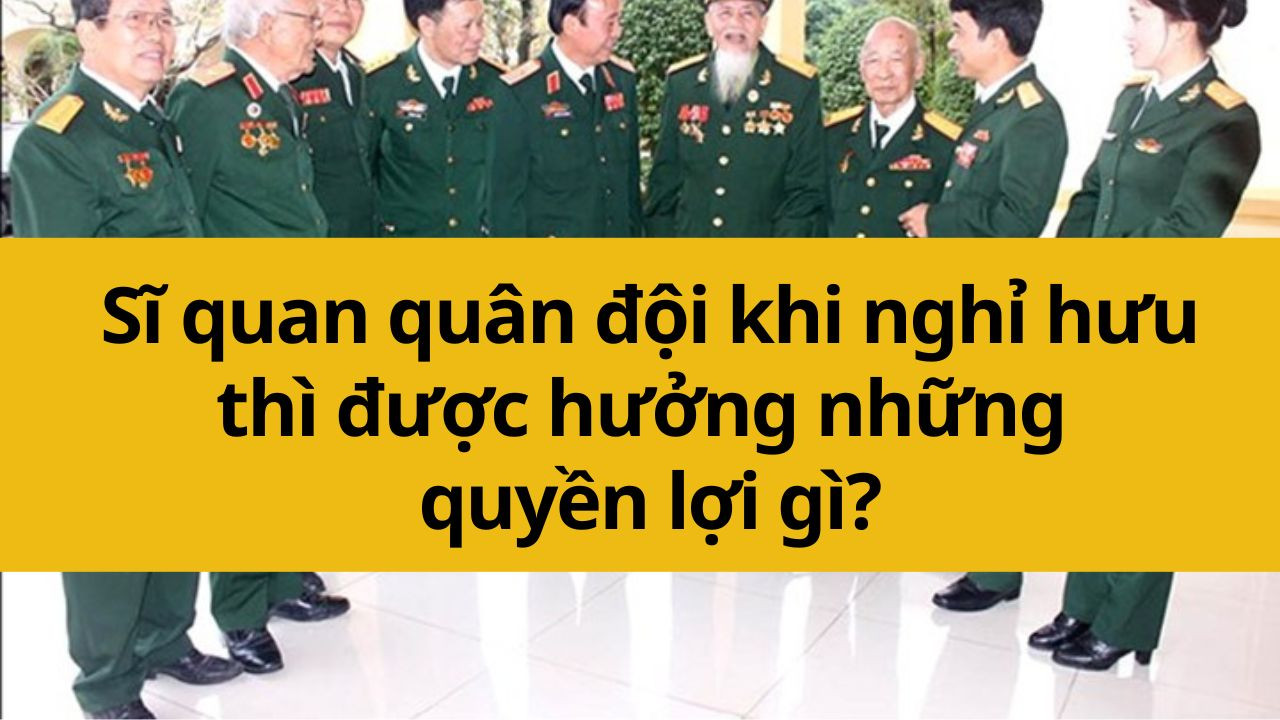
Sĩ quan quân đội khi nghỉ hưu thì được hưởng những quyền lợi gì mới nhất 2025?
Việc nghỉ hưu của sĩ quan quân đội không chỉ đánh dấu một chặng đường dài phục vụ tổ quốc mà còn gắn liền với các quyền lợi và chế độ đặc biệt, nhằm đảm bảo đời sống ổn định cho họ sau khi rời quân ngũ. Trong năm 2025, các quy định về quyền lợi của sĩ quan nghỉ hưu có những điểm mới quan trọng, bao gồm chế độ lương hưu, trợ cấp một lần, cũng như các quyền lợi về khám chữa bệnh, nhà ở, và các phúc lợi khác. Bài viết này sẽ cập nhật các quyền lợi mà sĩ quan quân đội được hưởng khi nghỉ hưu theo các quy định mới nhất, nhằm giúp hiểu rõ hơn về chế độ chính sách dành cho họ. 31/12/2024Tuổi nghỉ hưu của sĩ quan quân đội mới nhất 2025
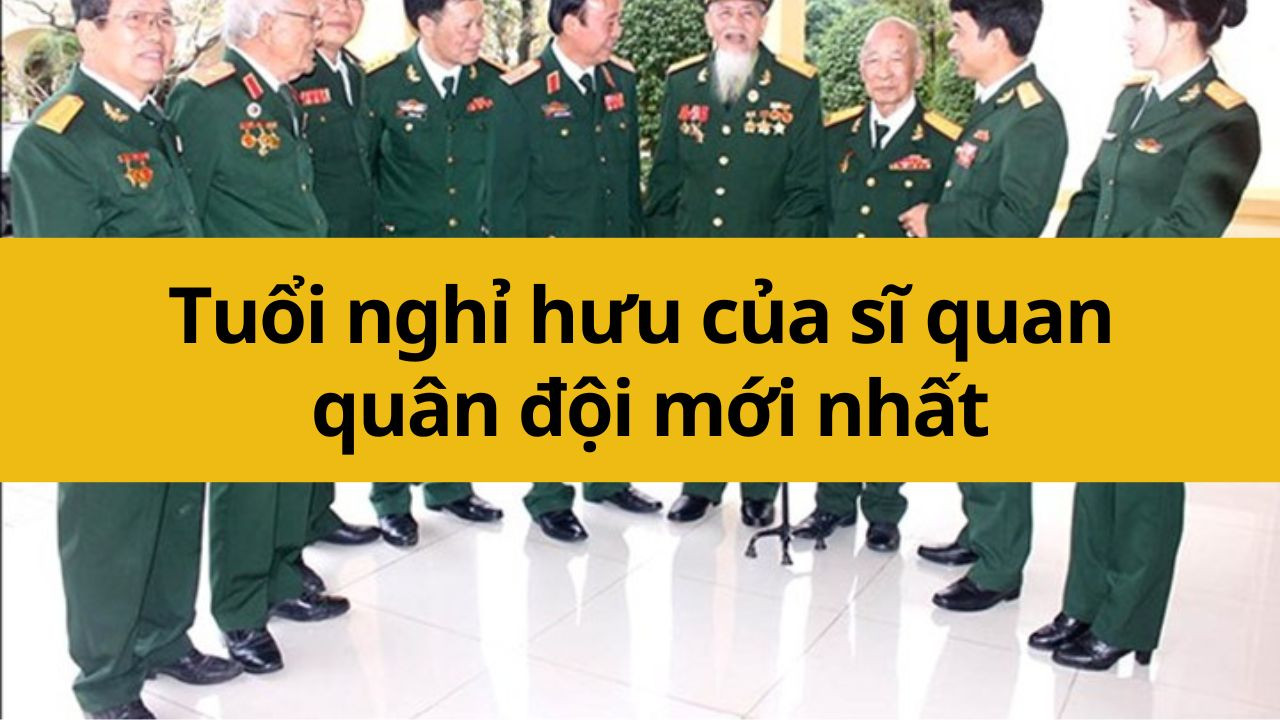
Tuổi nghỉ hưu của sĩ quan quân đội mới nhất 2025
Trong quân đội, việc xác định tuổi nghỉ hưu của sĩ quan là một vấn đề quan trọng, ảnh hưởng trực tiếp đến công tác tổ chức và điều động cán bộ. Mỗi năm, các quy định về tuổi nghỉ hưu có thể được điều chỉnh nhằm đáp ứng yêu cầu phát triển của lực lượng vũ trang và tình hình thực tế của đất nước. Bài viết này sẽ cập nhật thông tin mới nhất về tuổi nghỉ hưu của sĩ quan quân đội, giúp hiểu rõ hơn về các quy định và chính sách liên quan. 31/12/2024Từ 01/7/2024 mức lương Trung úy quân đội nhân dân là bao nhiêu khi mức lương cơ sở thay đổi?
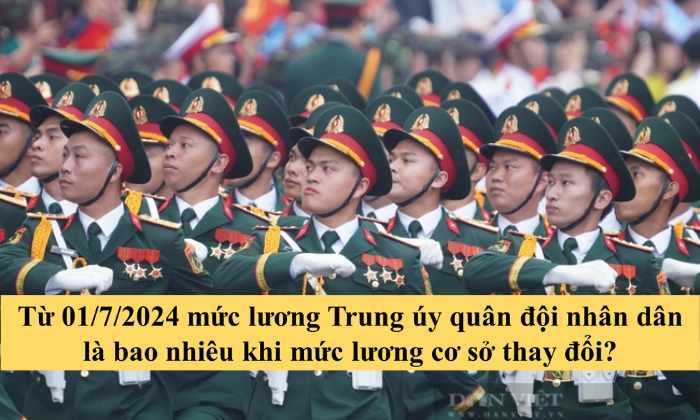
Từ 01/7/2024 mức lương Trung úy quân đội nhân dân là bao nhiêu khi mức lương cơ sở thay đổi?
Từ ngày 01/7/2024, mức lương cơ sở sẽ có sự điều chỉnh, kéo theo những thay đổi về thu nhập của cán bộ, công chức, viên chức, và lực lượng vũ trang, bao gồm cả Quân đội nhân dân Việt Nam. Đối với Trung úy - một trong những cấp bậc sĩ quan quan trọng trong quân đội, câu hỏi đặt ra là mức lương của họ sẽ thay đổi như thế nào khi áp dụng mức lương cơ sở mới? Bài viết này sẽ cung cấp thông tin chi tiết về mức lương của Trung úy Quân đội nhân dân sau khi mức lương cơ sở chính thức điều chỉnh vào tháng 7/2024. 09/11/2024Binh sĩ dự bị hạng hai bao gồm những đối tượng nào? Huấn luyện binh sĩ dự bị hạng hai phải đạt những yêu cầu gì?
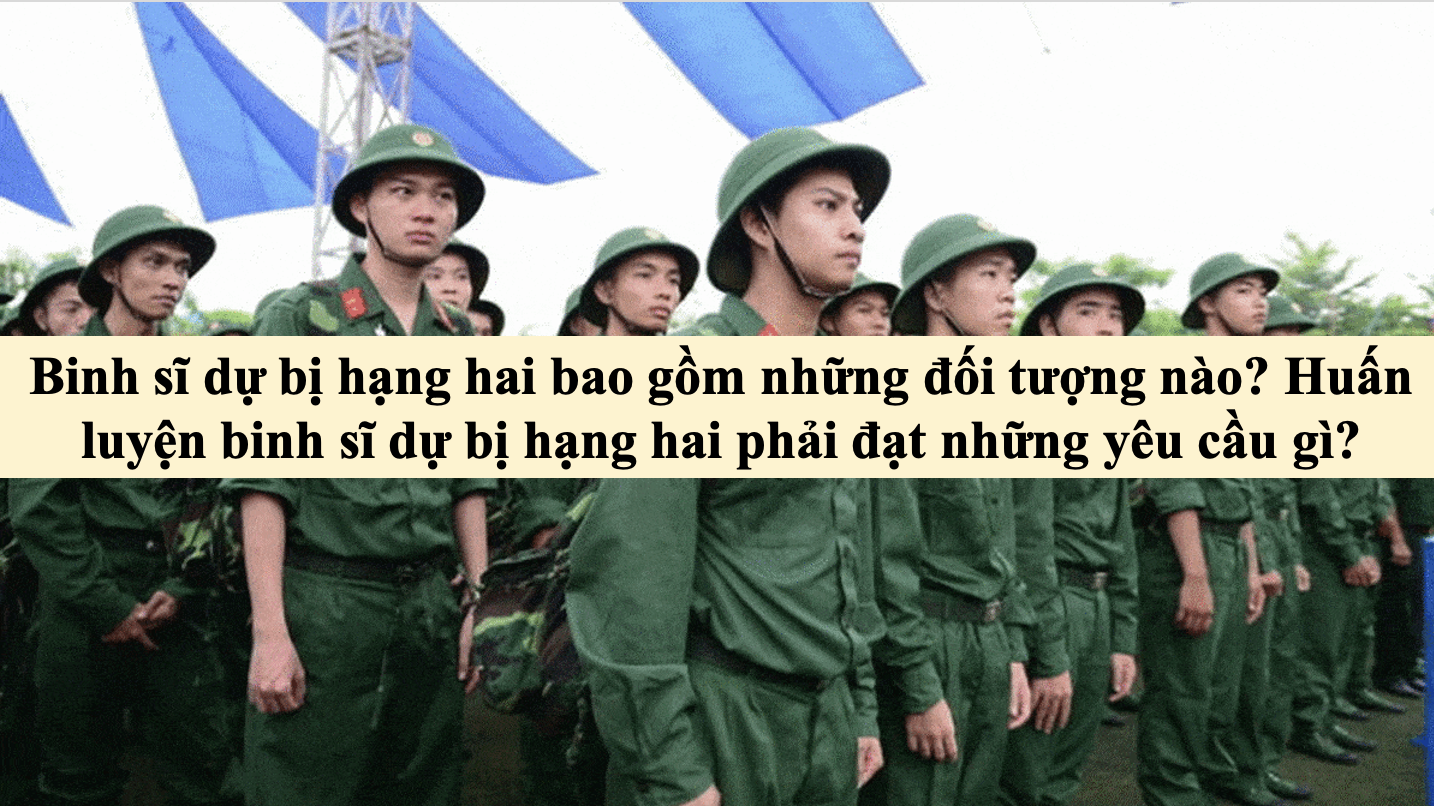

 Luật Sĩ quan Quân đội nhân dân Việt Nam 1999 (Bản Word)
Luật Sĩ quan Quân đội nhân dân Việt Nam 1999 (Bản Word)